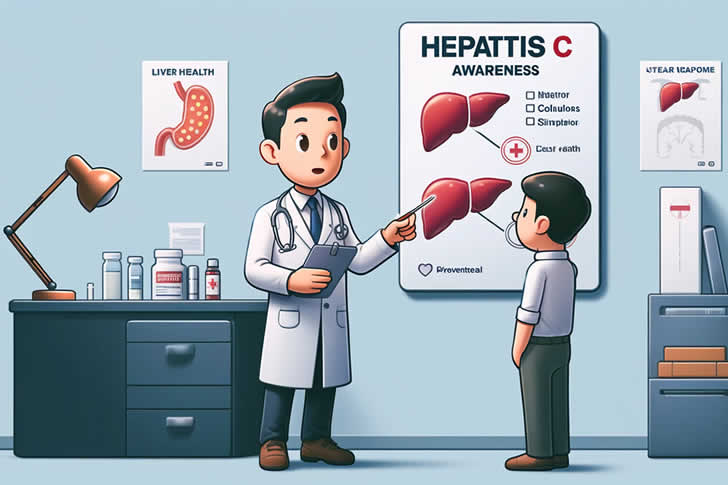Unraveling the Mystery of Hepatitis C Signs: What Experts Want You to Know
Hepatitis C is a viral infection that often shows few symptoms early on, but it can cause severe liver damage over time. Identifying the signs early and seeking appropriate treatment is critical for managing the disease effectively.

Understanding Hepatitis C
Hepatitis C is primarily transmitted through blood-to-blood contact, often through sharing needles, contaminated medical equipment, or receiving unscreened blood products. Over time, it can lead to serious liver conditions like cirrhosis or liver cancer. Unlike other forms of hepatitis, such as Hepatitis A and B, Hepatitis C often progresses silently, making it essential to recognize its subtle symptoms.
10 Common Signs of Hepatitis C
Many people with Hepatitis C remain asymptomatic for years. However, some common signs include:
- Fatigue: Persistent tiredness is one of the most common early signs.
- Jaundice: A yellowing of the skin and eyes due to liver dysfunction.
- Dark Urine: Urine may appear darker than normal as the liver struggles to filter waste.
- Abdominal Pain: Particularly in the upper right side of the abdomen.
- Loss of Appetite: Reduced hunger, leading to unexplained weight loss.
- Nausea and Vomiting: Digestive issues may occur as the liver’s functionality declines.
- Itchy Skin: Liver issues can lead to the accumulation of bile salts, causing skin itching.
- Swelling in the Legs: Fluid retention can cause swelling, also known as edema.
- Easy Bruising or Bleeding: The liver plays a role in blood clotting, and damage can result in easy bruising.
- Brain Fog: Cognitive issues such as difficulty concentrating can occur due to toxins building up in the body.
Key Aspects of Hepatitis C Treatment
Treating Hepatitis C today involves a combination of antiviral medications designed to clear the virus from the body. In most cases, patients can be cured with minimal side effects.
Modern Treatment Approaches:
- Direct-Acting Antivirals (DAAs): DAAs have revolutionized Hepatitis C treatment, targeting specific proteins in the virus to prevent its replication.
- Medicare Coverage: Medicare and most private insurances cover the cost of Hepatitis C treatment, although out-of-pocket costs can vary.
- Treatment Duration: The standard treatment length is usually between 8 and 12 weeks, depending on the patient’s specific strain of the virus and liver condition.
Common Hepatitis C Treatments and Costs
Below is a breakdown of common Hepatitis C treatment options available across the U.S., along with their price ranges, benefits, and suitable audiences.
| Region | Treatment Option | Price Range (per course) | Highlights | Suitable Audience | Advantages |
|---|---|---|---|---|---|
| New York, NY | Mavyret | $26,400 – $39,600 | 8-week treatment, high cure rate | Genotype 1-6, treatment-naive | Shorter duration |
| Los Angeles, CA | Harvoni | $63,000 – $94,500 | Once-daily tablet | Genotype 1, minimal liver damage | Easy dosage |
| Chicago, IL | Zepatier | $54,600 – $81,900 | Safe for patients with kidney issues | Genotype 1 and 4 | Safe for certain comorbidities |
| Houston, TX | Epclusa | $74,760 – $112,140 | Pan-genotypic, 12-week course | All genotypes | Effective across all genotypes |
| Phoenix, AZ | Vosevi | $74,760 – $112,140 | Used for patients who failed prior therapy | Genotype 1-6 | Effective for resistant cases |
| Philadelphia, PA | Sovaldi | $54,600 – $81,900 | Often combined with other drugs | Genotype 1-4 | Flexible dosing options |
| Miami, FL | Ribavirin | $500 – $2,500 per month | Usually an add-on to other antivirals | Advanced liver disease | Enhances antiviral effectiveness |
| Denver, CO | Interferon-Free DAAs | $50,000 – $90,000 | No need for interferon | Various genotypes | Less side effects |
| Seattle, WA | Viekira Pak | $80,000 – $110,000 | Multi-drug treatment in one pack | Genotype 1 | Comprehensive therapy |
| Atlanta, GA | Daclatasvir | $60,000 – $95,000 | Often combined with Sovaldi | Genotype 1-3 | Powerful in combination therapy |
Bullet Points: Key Considerations for Treatment
- Medication Side Effects: Most modern Hepatitis C medications have fewer side effects than older treatments.
- Treatment Success Rates: Cure rates for Hepatitis C with DAAs exceed 95%.
- Access to Treatment: Check if your insurance covers the treatment, or explore assistance programs.
- Liver Health: Patients with advanced liver damage may need additional monitoring during treatment.
- Follow-up: Even after a cure, regular liver health check-ups are recommended.
Q&A Section
Q: How long does it take to cure Hepatitis C?
A: Treatment duration varies but is typically between 8 to 12 weeks. The newer antiviral medications are highly effective, with cure rates exceeding 95%.
Q: Can Hepatitis C be treated if I have liver cirrhosis?
A: Yes, even patients with advanced liver cirrhosis can be treated for Hepatitis C. However, treatment may be more complex, and follow-up is critical.
Q: Is Hepatitis C the same as Hepatitis B or HPV?
A: No, Hepatitis C is a different virus from Hepatitis B and HPV (Human Papillomavirus). Each virus has distinct modes of transmission and impacts different organs. Hepatitis C specifically affects the liver, while HPV primarily impacts skin and mucous membranes.
The Costs of Treatment Across the U.S.
The cost of Hepatitis C treatment depends on the medication prescribed, treatment length, and whether or not the patient has insurance coverage. Many treatments are covered under Medicare, but copayments and deductibles can still apply. The table above provides a broad overview of the costs and highlights in different regions.
Conclusion
Hepatitis C, once considered a chronic and incurable disease, is now highly treatable. Early detection and treatment are key to preventing long-term liver damage and complications. By understanding the signs of Hepatitis C and seeking treatment, patients can dramatically improve their quality of life and health outcomes. Always consult a healthcare provider to discuss your options for testing, treatment, and follow-up care.
Citations:







Recent Comments